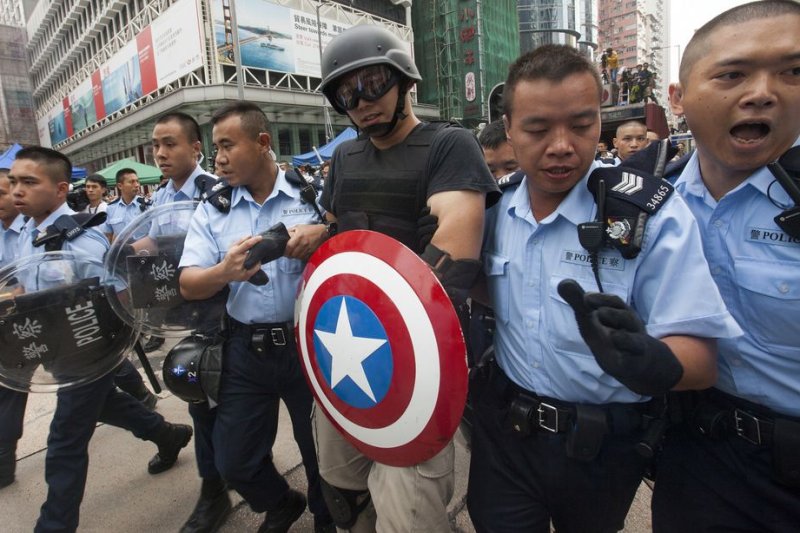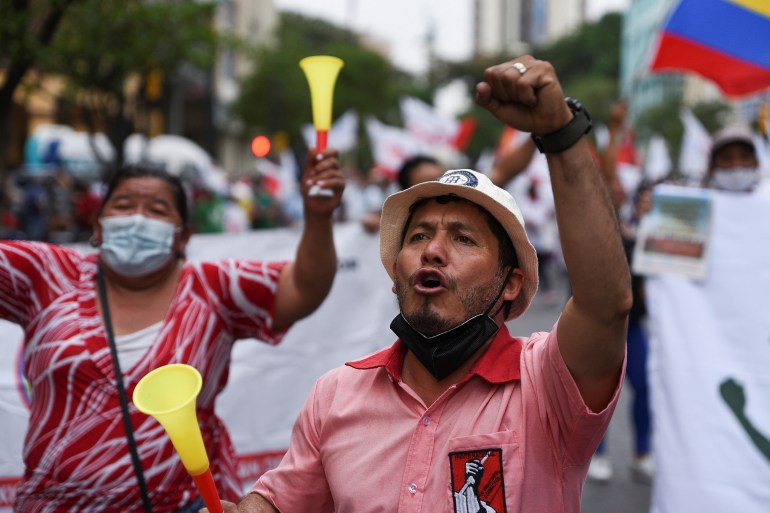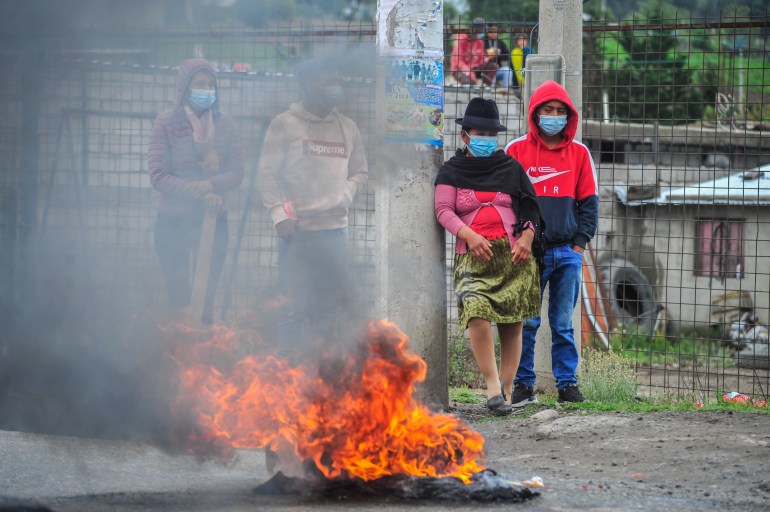CRIMINAL CAPITALI$M

Tue., October 26, 2021,
PORT-AU-PRINCE, Haiti (AP) — Youri Mevs knew that the call was coming, and she was terrified.
Mevs is a member of one of the richest families in Haiti; she owns Shodecosa, Haiti’s largest industrial park, which warehouses 93 percent of the nation’s imported food. Like everyone else, she has watched with despair as her country descended into chaos since the assassination of President Jovenel Moise.
Her office got the call one early morning in August. It was from Jimmy Cherizier -- aka Barbecue, a former policeman who leads the G9 gang coalition which controls the coastal strip of Port-au-Prince. Most of Haiti’s food and gasoline flows through his domain, and he can stop it with a single word.
Barbecue’s demand: $500,000 a month, a “war chest” he claimed would be used to buy food for the hungry and fight for democracy.
Pay the price, no problems. Refuse, and Shodecosa would be ransacked, and the gangs also would block the roads around the port terminal owned by the Mevs family.
_____
This story is part of a series, “Haiti: Business, Politics and Gangs,” produced with support from the Pulitzer Center on Crisis Reporting.
____
Mevs knew the threat was credible. Three neighboring warehouses were looted in June. It came down to math: “How much do we make? Can we afford it?” The answer was no.
Should she fight back? Again, no. “We are not going to shoot a gun to defend a bag of rice.”
There was nowhere to turn for help. In Haiti, there is no functioning government. For decades, the country was ruled by political strongmen supported by armed gangs; with Moise’s killing, the state collapsed and the gangs were unbound.
Having lost their meal ticket — the government — the gangs have become independent predators. While some turned to kidnapping, like those who captured 17 missionaries and their relatives, Barbecue’s men took control of the port district, gaining a stranglehold on the country’s economy.
Mevs is far from poor. She is not starving, not struggling for survival -- in so many ways, she is unlike the migrants who are fleeing Haiti’s misery. Like others of her caste, she traces her roots to ancestors who came to Haiti generations ago from Europe and the Middle East and built fortunes.
But like those emigrants, she and others among Haiti’s wealthy elite have few illusions about life in Haiti. She wants her daughters to join those families moving abroad while the future of the country is settled. If life does not improve, she may have to sell what she owns and join them.
In the meantime, she vows to stand up and fight the political battle to rebuild the government and country. She accepts that the gangs are part of the Haitian eco-system, something to be dealt with constantly as she struggles to keep her business going.
But Barbecue and his gang are immensely powerful. Her money, her contacts with rival gangs, her political connections -- all may be to no avail.
___
On a hot October morning, Barbecue -- the name comes from his mother’s occupation, selling food at a street stall -- receives reporters in his stronghold of Bellecour-Cité Soleil, a wretched neighborhood of tin shacks without water, electricity or any basic services.
Barbecue unboxes two new, American-made AK rifles with ammunition. Then surrounded by a dozen young, hooded men armed and dressed in brightly colored T-shirts and sneakers, he walks to the perimeter wall that encloses Terminal Varreux, the port owned by the Mevs family.
No, he insists. He did not ask for money from the Mevs in exchange for not looting their properties. “If I did that, they would have killed me by now,” he says.
Barbecue fancies himself a man of the people and an enemy of the elite. He speaks blithely of a possible civil war of the poor against the rich and powerful “foreign” families who own Haiti.
This, he says, is what he believes: “Water, housing, school, university, security for all and not only for the 5% who have lighter skin” -- the rich families like the Mevs.
“I have hatred for those people, every time we look at them we can say that there are two Haitis. We have to put an end to the system of dispossession.”
He mingles with the people of Bellecour-Cité Soleil, trying to present himself as not a gangster but as a revolutionary leader fighting for social change. He is not very successful.
Carrying a gun, he enters shacks without permission and does not say hello to the people living there before launching into diatribes about their living conditions. Generally, the occupants look down in silence, extras in a movie they played no part in producing.
Barbecue gestures to a teenager who walks behind him. The youth pulls a wad of bills from his back pocket and gives some to Barbecue; he, in turn, hands the money to the woman of the house.
“Their position is that of mental slaves, they have not always understood the struggle,” he says.
He says he can do little more for slum dwellers. And despite all appearances, he says he is not positioning himself for a political career. He claims not to have any political affiliation or party and says he does not see himself “as a candidate in a system that I see as corrupt.”
Mevs and others dismiss nearly everything Barbecue says as posturing -- especially his claims that he is not corrupt but an enemy of corruption.
He has been accused -- by the United Nations and other international organizations -- of participation in three massacres between 2018 and 2020.
The bloodbaths, said to have been sponsored by high-ranking officials in the Moïse administration, left more than 200 people dead. Women were gang-raped, and entire neighborhoods were burned, displacing thousands.
Barbecue’s extortion is brazen. And sometimes, a payoff is not enough to guarantee protection.
For 20 years, Giovanni Saleh, 44, rented a warehouse from the Mevs. It was located halfway between Cité Soleil and Shodecosa, the Mevs’ industrial park.
Saleh can offer no explanation for of what happened starting on the morning of June 6. He had complied with the rules. He had, he says, a “stable and correct” relationship with the gang.
“The last day I went to the warehouse I was preparing the food I used to leave for the gang every two weeks” -- cans of tomatoes, cartons of spaghetti, oil, beans, 20 sacks of rice. “I collaborated with them with food and some money on a regular basis.”
Saleh says he received a call from Merci Dieu, a member of Barbecue´s gang coalition: “We are going to block the area for a couple of days to ask for money from the government and trucks leaving the port, so come now and take whatever you need and then stay away for some days.”
Two days later, a friend called Saleh to tell him that there were rumors of an attack against his warehouse. He called security, no answer. He checked the cameras online and they were off. He called police, called everyone he knew. Nobody would do anything.
Saleh lost $3.5 million in goods over three days, as thousands of people directed by Barbecue and a colleague disassembled his warehouse box by box, bag by bag, shelf by shelf. Drone footage he took shows a constant and orderly flow of looters entering the warehouse from two directions.
Guards told him later that armed men fronting a mob had come to the door and knocked.
“Who would shoot? No one would shoot,” Saleh said. “They opened the doors and left.”
Saleh has sent his wife and two kids to Santo Domingo, and wants to join them. But for now he is rebuilding his business. He has taken out loans to reopen in the Mevs’ industrial park.
Youri Mevs “may be making the same mistake I made. I thought that by dealing with them, they would protect me, but they didn’t,” he said. “They charge you, one way or the other, for protection, but instead of protecting you against other gangs or even the police, they turn against you.”
___
Magalie Dresse lives in an elegant home in the heart of Port-au-Prince, with a well-tended garden where she does yoga in the morning. “I need the strength to go out there and handle what I’m going to find, which is not going to be positive.”
Since 2004, her car has been attacked; she has survived two kidnapping attempts; the government expropriated some of her properties; and her factory was damaged by arson in riots, costing her $400,000 in a single day.
And then there are the gangs. “At one point,” she says, “we´ve had cash at home during the weekends in case a friend needed it for a ransom and banks were closed.”
Dresse’s business sends about 50 containers of art to the United States each year. But before they arrive at the port, they must pass through gang-controlled areas.
“They can open them, check if there is something they want or even set them on fire,” she says. So “we pay the police, then sometimes we have to pay a gang because they can barricade the route.”
Later, she acknowledges that “some businesses” -- not hers -- “decide to have their own gangs on payroll. And that choice is the story of many companies in Haiti.”
At the end of the day, she holds a cocktail party for friends and associates, and they swap stories about the impossibility of business life in a gangster nation.
“If you have $5 million worth of merchandise to unload and deliver, $50,000 (in bribes) is something you can deal with,” says Geoffrey Handal, entrepreneur in the shipping industry and former president of the Franco-Haitian Chamber of Commerce.
But the uncertainty -- the possibility that Barbecue might close the port for three days, or block trucks -- is impossible to live with.
Political use of gangs in Haiti dates back to the 1960s, when Francois Duvalier created the Tonton Macute, a civil force that spread terror in the population for decades. When deposed president Jean-Bertrand Aristide ruled early in this century, he also created his own armed gang, the “chimères,” based in Cité Soleil.
Moise and his predecessor, Michel Martelly, used gangs for hire to control the coastal areas where a large number of votes were concentrated.
When Moise was assassinated, the gangs decided there was no need to serve as middlemen for politicians anymore. “Why would they accept being used if they could manage the business?” Handal asks.
Barbecue’s revolutionary rhetoric is empty, he says. “If someone offers Barbecue 5% more than what he is making right now, he will change allegiances immediately.”
For Handal, the issue is simple: How low must businesspeople stoop to succeed in a gangster nation? “Do you want to become one of them? Are you willing to have blood on your hands?”
Instead, Dresse says the solution is citizenship.
“We need people like us involved in politics with a long-term approach,” she says. “We need to create a new political party.”
___
Youri Mevs does not pay the $500,000 extortion. She orders one of her managers to supply some of Barbecue’s rivals: “Get them corn flakes, milk, pasta, tomato and soap.” How much? “$5,000.”
She describes it as “looking for ways of compensating for the non-aggression.” She does not believe in cash donations because “they will use them to buy ammunition,” so she donates goods that cannot be used “to hunt me or people like me.”
She has staked her future on the political system, one with overtones of the failed past.
When Moise’s government began to fall apart, she decided she could no longer talk about “they” and “them” when she referred to her own country: “Because I belong to the caste, I know what the caste has done to this country and what the country is doing to my caste.”
In 2016 she met Youri Latortue, a veteran politician who was then president of the Senate. Latortue asked her to help with a report about a corruption scheme during Martelly’s administration.
In 2018 she became secretary general of Latortue´s party, AAA, which has led the opposition against Martelly and Moise since the 2016 elections. Now Latortue is “waiting for the party nomination” and Mevs is running his campaign.
Latortue has been accused of a lot in the past, from corruption to running gangs. He denies it all, and has never been formally accused. He says he wants to break with the Haitian tradition of strongmen and militias; that can only happen, he says, “with a strong state, a strong public force, and institutions that guarantee the functioning of the state.”
Latortue and Mevs have proposed a special police unit, trained by international experts, to fight the gangs. And they want to put Barbecue behind bars.
But in the meantime, Mevs has to deal with him.
At the AAA headquarters, a truck awaits to be loaded with the food she ordered that morning. This is how she rationalizes the payoff: “It is a donation from the political party to a neighborhood. ... It is populism, but people are hungry. There is nothing wrong in giving them food.”
Even if so, Latortue cannot be tied publicly to the shipment. “Some people could accuse me of giving them weapons because the place is at war,” he explains.
The two delivery men are tied to their phones, discussing the route. There are reports of gunfights, it is going to be a long route of discussions and shouts and detours along the way to the “backdoor entrance” of a barricaded front line.
The truck stops three times, on three parallel streets. Every corner is guarded by a dozen young men. They unload the truck into a house, a school, a party office.
Behind them, on empty streets, gunshots ring out and armed young men stand guard at a barricade. They call themselves a self-defense group. They are simply one of Port-Au-Prince's gangs.
Alberto Arce, The Associated Press

































